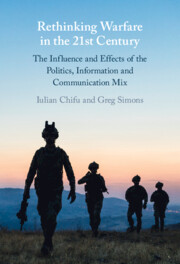 Rethinking Warfare in the 21st Century
Rethinking Warfare in the 21st Century Book contents
- Rethinking Warfare in the 21st Century
- Rethinking Warfare in the 21st Century
- Copyright page
- Dedication
- Contents
- 1 Introduction: Motivation, Purpose and Structure of the Book
- 2 Informational Warfare: A Theoretical Approach
- 3 Understanding Political and Intangible Elements in Modern Wars
- 4 The Fourth Generation of Informational Warfare
- 5 The Culture and Language of Contemporary Armed Conflict
- 6 Different Shades of Information and Communication in Armed Conflict: White, Grey and Black
- 7 The Effects of Technological Evolution and Social Media on the Individual, Society and Politics
- 8 Western Hybrid Warfare: Crisis and Subversion in Regime Change
- 9 Geopolitics in the Age of Social Media: The Struggle for Influence on Ukraine
- 10 The Ukrainian and Syrian Conflicts: Civil Wars or Geopolitical Shatterbelts?
- 11 The Impact of the COVID-19 Pandemic on Humankind, Society, and Politics
- 12 Conclusion: Summing Up the Knowledge and Answering the Questions
- Index
- References
7 - The Effects of Technological Evolution and Social Media on the Individual, Society and Politics
Published online by Cambridge University Press: 29 June 2023
- Rethinking Warfare in the 21st Century
- Rethinking Warfare in the 21st Century
- Copyright page
- Dedication
- Contents
- 1 Introduction: Motivation, Purpose and Structure of the Book
- 2 Informational Warfare: A Theoretical Approach
- 3 Understanding Political and Intangible Elements in Modern Wars
- 4 The Fourth Generation of Informational Warfare
- 5 The Culture and Language of Contemporary Armed Conflict
- 6 Different Shades of Information and Communication in Armed Conflict: White, Grey and Black
- 7 The Effects of Technological Evolution and Social Media on the Individual, Society and Politics
- 8 Western Hybrid Warfare: Crisis and Subversion in Regime Change
- 9 Geopolitics in the Age of Social Media: The Struggle for Influence on Ukraine
- 10 The Ukrainian and Syrian Conflicts: Civil Wars or Geopolitical Shatterbelts?
- 11 The Impact of the COVID-19 Pandemic on Humankind, Society, and Politics
- 12 Conclusion: Summing Up the Knowledge and Answering the Questions
- Index
- References
Summary
The technological evolution currently being experienced globally, comes with a tremendous number of different advanatages. However, there are also new threats and vulnerabilities that are being exposed that can adversely affect national security. This is evident in the social media environment. Therefore, the current research needs to focus on understanding the balance between pros and cons in a pragmatic way to understand the actual and potential impacts (physical and psychological) on society.
- Type
- Chapter
- Information
- Rethinking Warfare in the 21st CenturyThe Influence and Effects of the Politics, Information and Communication Mix, pp. 184 - 218Publisher: Cambridge University PressPrint publication year: 2023


